
In a monastery he is Christ’s representative…
What is leadership?
As I have sat with, prayed through and read the Rule of St. Benedict over the last three weeks the question of the role and significance of an abbot in the life of a person who desires to take on a form of monastic life has been pressing. I suspect the abbot has to be important if, before anymore details over the running and understanding of the monastic life is explored, this pragmatic, as well as spiritual, description of the character and role of the abbot is introduced.
In recent decades the role of a leader has become increasingly emphasized within churches. We now have a Global Leadership Conference and Holy Trinity Brompton host a large leadership conference in the Albert Hall. This striving towards better leaders makes me feel uncomfortable. The strategy and the techniques are taught with such ease that it seems that anyone can be a leader if they know the right stuff and do the right thing. I can agree that anyone can be a leader but it is a calling given by God and seen by others.
St. Benedict seems to be keen to emphasize the responsibility of leadership within the monastic life as being heavily spiritual; there are management concerns, yes, but this ‘leader’ ‘will be accountable on Judgement Day for his teaching and the obedience of his charges’, ‘he should know that the greater his trust, the greater the responsibility’ and he ‘must not undervalue or overlook the salvation of his charges. Thus he must always remember his task is the guidance of souls (for which he will be held accountable) and he must put aside the worldly, transitory and petty things.’
During my time at Cranmer Hall, Durham, we had a module of Christian Leadership. At the time I sat this module it was being taught by two godly men with one style or model of leadership: the chief executive. This model is useful within large organized congregations where there are lots of ‘departments’ working efficiently to share resources, both material and human, towards growth.
I have, in the past, been very critical of this approach to leadership and, although I have mellowed and grown to appreciate the strengths of such approach I remain questioning of the common expressions of it. My critique comes in how theology and spirituality is shaped by a model and the leadership of Jesus becomes too strategic and ‘task’ orientated. I have seen and experienced great harm done to people with this managerial approach to oversight and wisdom, grace and forgiveness have been squeezed too much in favour of the growth of the church and its reputation.*
The last session in our Christian Leadership module was led by Rev. David Day, a retired minister and ex-principal of St John’s College, Durham. His session was entitled ‘The Spirituality of Leadership’. I remember at the end of this session many of us held the double sided piece of A4 paper he produced as notes and knew that this was what the whole course should have been based on. I don’t want to explore Day’s session on leadership but one thing has sustained me as I took on an ordained leadership role within God’s church. It is a prayer of St Aelred of Rievaulx, an abbot.
To you, my Jesus, I confess, therefore;
to you, my Saviour and my hope,
to you, my comfort and my God, I humbly own
that I am not as contrite and as fearful as I ought to be
for my past sins;
nor do I feel enough concern about my present ones.
And you, sweet Lord,
have set a man like this over your family,
over the sheep of your pasture.
Me, who take all too little trouble with myself,
you bid to be concerned on their behalf;
and me,
who never pray enough about my own sins,
you would have pray for them.
I, who have taught myself so little too,
have also to teach them.
Wretch that I am, what have I done?
What have I undertaken?
What was I thinking of?
Or rather, sweetest Lord, what were you thinking of regarding this poor wretch?
(St Aelred of Rievaulx, ‘Treatises and Pastoral Prayer’ (Michigan: Cistercian Publications, 1995) p.107-108)
In this prayer I hear so much of Thomas Merton’s spirituality and it resonates with me. There’s a shared outlook on humanity, sin and this overwhelming sense of the grace of God. Humility is inescapable in this prayer and the prayers of other monastic writers.
As I read St. Benedict’s ‘qualities’ of an abbot I was struck by the expectations placed upon one person. The wisdom required for this role is impossible, unless you were the second incarnation of Christ Himself. It is easy to read this, in our current culture, fascinated with ‘the leader’, as a job description; things necessary to be called ‘a leader’. As an assistant curate in the church of England I’m aware of my assessment criteria to successfully prove to be ordained and affirmed as a minister in Christ’s church.
I try to not look at the Church Times’ classified sections as churches advertise for ‘rector’, ‘vicar’ and ‘minister’s but they may as well call a spade a spade and advertise for ‘Jesus Himself’. The tasks and qualities required as an ideal candidate is far beyond any fallen human being. I was glad to find an article written by ‘The Quotidian Cleric’ entitled, ‘The Perfect Job Advert’. What I like about it is it’s acceptance of the state of the human person behind the role of leader.
I think it’s important to note the title for chapter 64, ‘Election of the abbot’. It begins,
Always remember, concerning the election of an abbot, that he should be chosen by the entire community…
we will explore that in 62 weeks!
A leader is, before God, just another monk, dearly loved but desiring no individuality. As St. Benedict says,
…let everyone stay in his own place for “whether bond or free we are all one in Christ” (Rom. 2:11) and are equal in the service of the Lord; with god there is no respecter of individuals.
An abbot should not desire the role of authority for himself and should, along with the other monks, take responsibility for his own faithfulness and obedience under God. From this place, the call to discipline and rebuke is tempered with grace and humility. Love comes easier if you start from that place.
There is a conflict, however, within me. As the church in England heads into a missional mode of being, there is requirement for strategy and communication of discerned priorities. This focuses those, given authority by others, to make task orientated decisions. The pressure and skills needed to do this are greater and more stressful than we imagine; particularly if you add to this the expectation to also be aware of the emotional responses of many people as they hear and respond to the decision.

The Role of the Monks
If an abbot is called forth by the community then they support him. Even if they don’t see him as ‘Christ’s representative’ they are called to encourage him to be transformed into His likeness. No abbot is perfect because no human is. The qualities outlined in this chapter of St. Benedict’s Rule are not to be achieved prior to appointment but are rather the pattern that God will now shape them into. The abbot, after appointment, now looks to allowing God to shape him in this particular way.
I am increasingly convinced we should begin discussing the relationship between role and gifting in that order. It is commonly spoken of in these terms: one receives spiritual gifts, given by grace to all, and with those you discover the call to a particular ministry within God’s church.
Firstly, the ministry is in the Kingdom of God and not solely activities run within church structures.
Secondly, I see, through Scripture, men and women being called first and then equipped second; Abraham and Sarah, Moses, Samuel, David, Mary, Peter, Matthew… Humility is easier to receive if you have nothing else given. All calls from God should begin with humble confused as to how we could possibly do what He is asking of us. If we, when we hear his call into a particular ministry/task say “Oh, that makes sense because you’ve given me these gifts to do it.” Then there’s no humility; you are trusting the gift before the giver.
And thirdly, the concern I have with the pattern of discussion around spiritual gifts and ministry is that if the gifts are given before any task is commanded by God, then you limit what God will ask of you. This is particularly instilled when we are given only one spiritual gift. If we begin by asking “Lord, what is it you want me to do, poor as I am?” then God can call you anywhere to do anything. It is right and Scriptural to respond, “How am I to do that, poor as I am?” And He will respond, “I will give to you what you need; the words, the strength, the insight. Follow my spirit and all things will be made available.” Once the task is done we turn and ask again, “What now?” He can still, if He is able to give more gifts for new tasks, command you to go somewhere else, where you have no experience and no skills. “That’s foolishness!” you say, “Why doesn’t He keep me on my career ladder building on from where I ended?” Because, it’s not about you can do but what He can do. He wants to show His glory and power because there is no other way you could achieve things He wants to achieve through you. Take Moses. There is no way he could have accomplished the Exodus. The glory went to God.
The role of the other monks, therefore, is to receive the abbot’s ministry as from God. To pray that God will use the abbot for the spiritual growth of His Kingdom. The abbot will not always do so as obediently as the monks or God would have liked but they forgive and encourage to see God use the broken vessel for His glory and His Kingdom.
Reflection
An Abbot is God’s representative within the monastery. The question, ‘Who is my abbot?’ will remain until there is a community from which the abbot is called.
I’m currently exploring a shared life within a small ‘missional community’ called ‘Burning Fences‘. These people are dear friends all exploring faith and are at different places on their journey with God. We come together not around a set of creedal statements but rather a shared desire to know and experience God (whatever that might mean). In a way, a spiritual community is growing amongst us and I remain expectant that God will reveal something profound in our midst. I wait for the revelation of what God is doing in, with and through us.
Until then, I continue to look to God as Abba and pray,
Abba, Father, what am I to do today that will encourage Your Kingdom to grow? Send me out, in the power of Your Spirit and not my own, to live and work for Your praise and Your glory.
Come Lord Jesus
*Please note that I am aware the reality of leadership in these contexts and this model is not as sinister as I depict and I am being overly general. I say this to paint an extreme in order to clarify the distinction between what I see in one model and what might be offered in another.


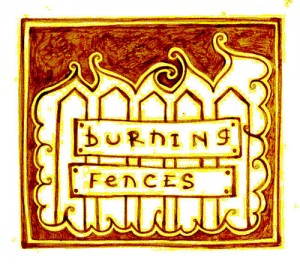 I have had the privilege of being welcomed into a community over the last year which has had an ongoing and deeply transformative impact on me and my vocation as an ordained priest. The community are mainly in their twenties and would, at a cursory glance, be classified as ‘arty’ intellectual types, although this is not entirely true; not that they are not either of those things but that which unites this group isn’t those two general categories. It is only in the last month or so that I have begun to grasp the ‘charism’, the ‘je ne sais qua’, of Burning Fences.
I have had the privilege of being welcomed into a community over the last year which has had an ongoing and deeply transformative impact on me and my vocation as an ordained priest. The community are mainly in their twenties and would, at a cursory glance, be classified as ‘arty’ intellectual types, although this is not entirely true; not that they are not either of those things but that which unites this group isn’t those two general categories. It is only in the last month or so that I have begun to grasp the ‘charism’, the ‘je ne sais qua’, of Burning Fences.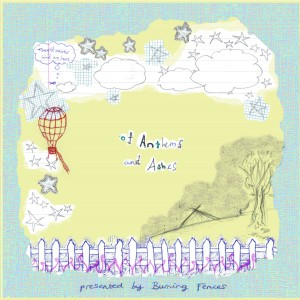 Before I stumbled through the doors one cold December night, this community had been meeting, singing and telling stories for a year or more. They had produced a CD of songs which they had developed entitled ‘Of Anthem and Ashes’. The images that were resonating with them then and remain reverberating through our times together are phoenix like resurrections; songs sung in the rubble, new plants breaking through concrete. These images have always resonated with me and it’s why I know I am a ‘fence burner’.
Before I stumbled through the doors one cold December night, this community had been meeting, singing and telling stories for a year or more. They had produced a CD of songs which they had developed entitled ‘Of Anthem and Ashes’. The images that were resonating with them then and remain reverberating through our times together are phoenix like resurrections; songs sung in the rubble, new plants breaking through concrete. These images have always resonated with me and it’s why I know I am a ‘fence burner’. The times when Church is most frustrating, for me, is in the ‘necessary organization’. What irks me is the lack of convincing Biblical precedent. The Temple system failed and yet here we are in the 21st century rebuilding it. I get it, organic is messy and uncontrollable, unpredictable but it’s how the world functions. We human beings are devastating when we control and tinker with the organic creation. We’ve tried to organize the world and what we discover is we’re trapped in boxes which do not fit nor encourage us to flourish in the ways in which we should.
The times when Church is most frustrating, for me, is in the ‘necessary organization’. What irks me is the lack of convincing Biblical precedent. The Temple system failed and yet here we are in the 21st century rebuilding it. I get it, organic is messy and uncontrollable, unpredictable but it’s how the world functions. We human beings are devastating when we control and tinker with the organic creation. We’ve tried to organize the world and what we discover is we’re trapped in boxes which do not fit nor encourage us to flourish in the ways in which we should.
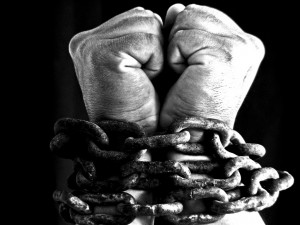
 Where he came from, neither of them knew. How he got past their captors; who could say? He was either a fraud, one of the warders provoking them for his own amusement; or their captors had fled leaving the cell unguarded; or it was a miracle. None of this mattered much as he walked over to them and spoke.
Where he came from, neither of them knew. How he got past their captors; who could say? He was either a fraud, one of the warders provoking them for his own amusement; or their captors had fled leaving the cell unguarded; or it was a miracle. None of this mattered much as he walked over to them and spoke.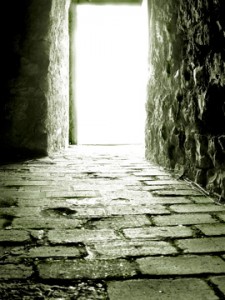 Through the doors they saw their guards sleeping soundly. It seemed so strange – no – illogical that they could slumber during a rescue mission in the jail they were meant to watch. The whole incident was feeling so mysterious and implausible; a dream with no reason. Yet this man kept leading them down the corridor towards a bright light; the final exit to freedom.
Through the doors they saw their guards sleeping soundly. It seemed so strange – no – illogical that they could slumber during a rescue mission in the jail they were meant to watch. The whole incident was feeling so mysterious and implausible; a dream with no reason. Yet this man kept leading them down the corridor towards a bright light; the final exit to freedom.
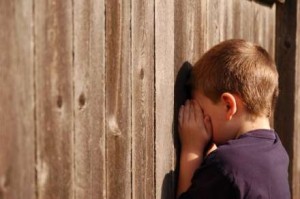 24. What is an encounter with the ‘hidden’ God like?
24. What is an encounter with the ‘hidden’ God like?